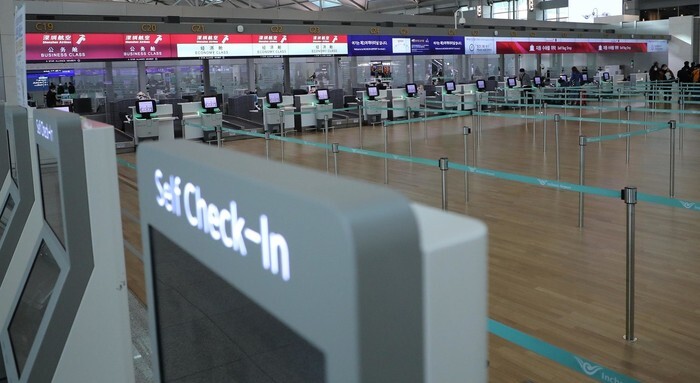hankyoreh
Links to other country sites 다른 나라 사이트 링크
[Editorial] The harmful effects of misinformation and Sinophobia amid the coronavirus outbreak

As of Jan. 28, more than 4,500 people in China have tested positive for the new coronavirus, with fatalities climbing above 100. This contagious disease is rapidly gaining ground around the globe, with the first confirmed cases reported in Germany. Under such circumstances, it’s perfectly normal, and even reasonable, for people to feel anxious and be on their guard. What’s concerning, however, is the explosion of misleading information and baseless “fake news” and the apparent rise of Sinophobia. If anything, such a response could stymie efforts to stop the spread of the coronavirus.
Following the news that the third person to test positive for the coronavirus in South Korea had visited Gangnam in Seoul and Ilsan in Gyeonggi Province, rumors rapidly spread across internet communities and social media that the individual had also stopped by the Starfield shopping mall in Goyang, prompting South Korea’s Centers for Disease Control and Prevention (KCDC) to release a statement debunking the rumor. There’s been a profusion of false claims that the disease has caused fatalities in South Korea and unconfirmed information about where infected individuals are living, as well as text messages that lure users to click on supposedly informative links that are actually scams.
The government says it couldn’t immediately disclose the precise locations of the confirmed cases or the names of the hospitals because it needed time for verification and then disinfection, but vaguely informative statements have only fueled anxiety. Once the necessary steps have been taken, the government needs to satisfy public curiosity about information including the routes taken by the infected individuals and the people with whom they came into contact, without waiting for an official briefing. That’s one way to definitely shut down the spread of misinformation.
The signs of antipathy for Wuhan, where the disease broke out, and for China as a whole, are wholly undesirable. Videos of people collapsing on the streets of China — purportedly because of the coronavirus — are being shared, and numerous comments have voiced unhinged and hateful attacks on the custom of eating wild animals. More than 500,000 people have signed a petition on the Blue House website calling for all Chinese to be banned from entering the country. But we need to pay heed to experts who say that discriminating against Chinese or banning their entry could actually make people more hesitant to report symptoms and knock holes in quarantine efforts. After the government stopped using the phrase “Wuhan pneumonia” to refer to the disease, it was criticized in some quarters for being beholden to China. But avoiding a term that could provoke discrimination is just common sense, and is nothing to criticize.
Infectious diseases are a problem facing all of humanity. The Chinese government needs to be more transparent about the grounds for its claim that the disease is contagious even during its incubation period; it ought to make that information public and share it with other governments. The South Korean government needs to remember that the only way to assuage public fear is to quickly release the results of its full survey of all 3,000 people who visited Wuhan before entering the country. There’s also a critical need for more thoughtfulness and cooperation from the South Korean public.
Please direct comments or questions to [english@hani.co.kr]

Editorial・opinion
![[Editorial] Penalties for airing allegations against Korea’s first lady endanger free press [Editorial] Penalties for airing allegations against Korea’s first lady endanger free press](https://flexible.img.hani.co.kr/flexible/normal/500/300/imgdb/original/2024/0502/1817146398095106.jpg) [Editorial] Penalties for airing allegations against Korea’s first lady endanger free press
[Editorial] Penalties for airing allegations against Korea’s first lady endanger free press![[Editorial] Yoon must halt procurement of SM-3 interceptor missiles [Editorial] Yoon must halt procurement of SM-3 interceptor missiles](https://flexible.img.hani.co.kr/flexible/normal/500/300/imgdb/child/2024/0501/17145495551605_1717145495195344.jpg) [Editorial] Yoon must halt procurement of SM-3 interceptor missiles
[Editorial] Yoon must halt procurement of SM-3 interceptor missiles- [Guest essay] Maybe Korea’s rapid population decline is an opportunity, not a crisis
- [Column] Can Yoon steer diplomacy with Russia, China back on track?
- [Column] Season 2 of special prosecutor probe may be coming to Korea soon
- [Column] Park Geun-hye déjà vu in Yoon Suk-yeol
- [Editorial] New weight of N. Korea’s nuclear threats makes dialogue all the more urgent
- [Guest essay] The real reason Korea’s new right wants to dub Rhee a founding father
- [Column] ‘Choson’: Is it time we start referring to N. Korea in its own terms?
- [Editorial] Japan’s rewriting of history with Korea has gone too far
Most viewed articles
- 1Months and months of overdue wages are pushing migrant workers in Korea into debt
- 2Trump asks why US would defend Korea, hints at hiking Seoul’s defense cost burden
- 31 in 3 S. Korean security experts support nuclear armament, CSIS finds
- 4[Editorial] Yoon must halt procurement of SM-3 interceptor missiles
- 5Fruitless Yoon-Lee summit inflames partisan tensions in Korea
- 6[Guest essay] Maybe Korea’s rapid population decline is an opportunity, not a crisis
- 7[Editorial] Penalties for airing allegations against Korea’s first lady endanger free press
- 8Bills for Itaewon crush inquiry, special counsel probe into Marine’s death pass National Assembly
- 9[Column] Can Yoon steer diplomacy with Russia, China back on track?
- 10At heart of West’s handwringing over Chinese ‘overcapacity,’ a battle to lead key future industries